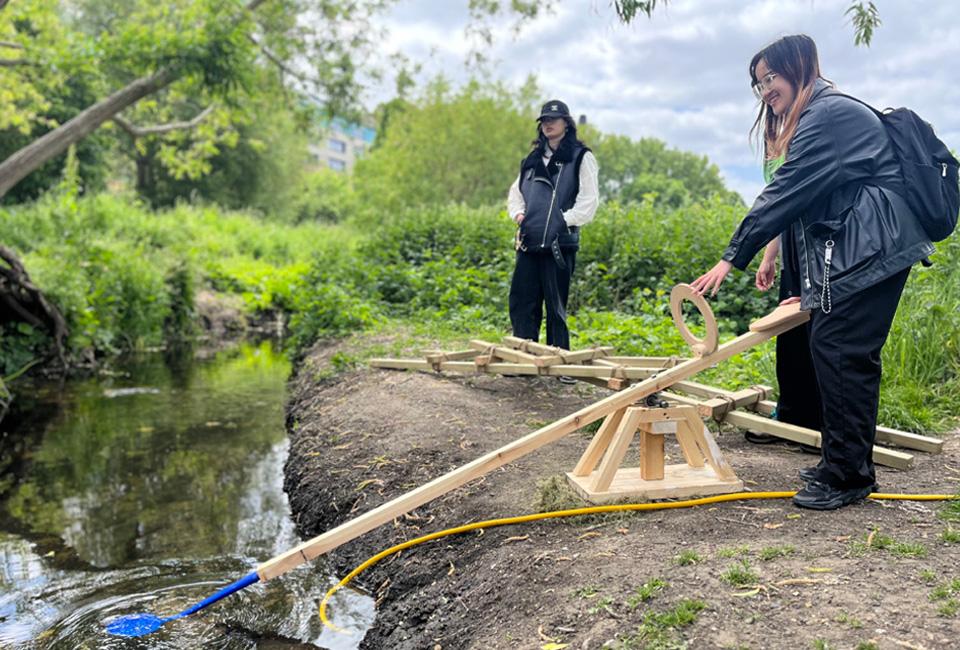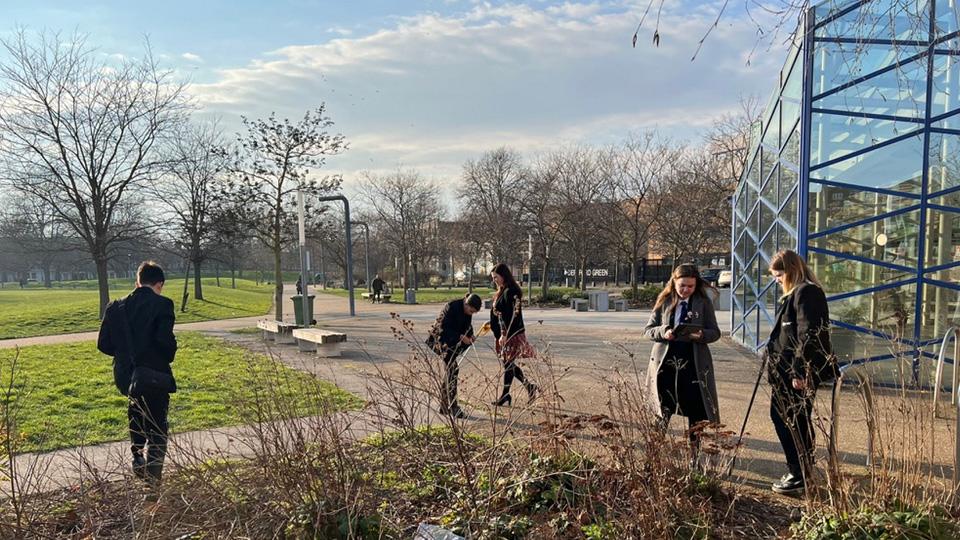Civic Catalysts
Civic Catalysts is a programme of activity designed to help link Goldsmiths research to the needs of the diverse communities within the London Borough of Lewisham.
Primary page content
Linked to the Goldsmiths Civic University Agreement (CUA), the aim of this programme is to bring researchers together with local partners and support them in developing partnerships, piloting ideas, and undertaking projects that will make a positive impact locally. We have supported projects under this programme working with homelessness charities, housing associations, community action groups and cultural start-ups.
As a community partner on one of our previous projects has put it: "This project has been transformational. It has allowed an experimental community project to be shaped in the best way possible…. This project will influence future community engagement work within Lewisham borough and beyond."
How it works
The programme provides networking opportunities, events and one-to-one support to help connect Goldsmiths research to local needs and concerns. There are also opportunities for catalyst funding to help get projects off the ground.
Civic Catalysts aims to initiate projects that relate to at least one of the priority areas set out in the Goldsmiths Civic University Agreement (CUA) (2021).
- Educational opportunities and learning aspirations
- Economic prosperity, jobs and growth
- Culture, health and wellbeing
- Environmental sustainability
More detail on our ambitions under each of these areas can be seen in the full CUA.
Contact
If you would like to contact the team to discuss a project that you feel fits the criteria above and would benefit from support – whether by finding a relevant academic at Goldsmiths, being matched with a suitable partner, or just having a chat – please contact community (@gold.ac.uk).
Past projects supported by Civic Catalysts
Evaluating the Migration Museums' People's Panel and Network
Migration Museum and Louise Doherty (STaCS)

This project was a collaboration between the Mona Jamil and Jason Page of the Migration Museum and Goldsmiths Lecturer and Researcher Louise Doherty.
Louise worked with Mona and Jason to evaluate the People's Panel and Network, an initiative established in 2022 to embed grassroots community engagement and co-production in the Migration Museum's work and ethos.
As well as evaluating the project’s processes and framework for co-production so far, Louise worked with Mona and Jason to locate the Migration Museum’s values via analysis of the workshops and surveys undertaken with the People’s Panel and Network.
An open access toolkit has now been produced offering practical advice and recommendations to other organisations seeking to embed meaningful co-production in their programming and community engagement practices.
The toolkit and final report from this project are now available on the Migration Museum’s website.
999 Club Impact Evaluation project
Dr Emma Jackson, researchers from the Centre for Community and Urban Research and the 999 Club
Deptford’s 999 Club is a long-established local charity supporting people experiencing homelessness or at risk of homelessness. As part of a programme of activity initiated by the charity’s 30th anniversary in 2022, Civic Catalyst funding supported Dr Jackson and a team of researchers from the CUCR to work with the 999 Club on developing an Impact Evaluation Report exploring the charity’s impacts as a local anchor institution in Lewisham.
Interviews were conducted with 999 Club clients and staff. Data was analysed and was synthesised to bring together a comprehensive report on the unique status of the charity and its role in the community. Findings included an affirmation of the value of the 999 Club’s unique holistic and human-centred approach to supporting vulnerable clients, and the importance of continuing to develop its recent focus on co-production and community-led service provision.
The report also pointed to the importance of 999 Club uncovering and celebrating its local links and history, including by potentially developing an archive, film or oral history project to better preserve the charity’s history and tell its story. Some of these recommendations have already been acted on by the 999 Club.
Read the full 999 Club Impact Evaluation report on the 999 Club’s website.
Take Me to Your River
Dr Tobie Kerridge and Dr Sarah Pennington (Design), Quaggy Waterways Action Group

This project explored new ways of fostering stewardship of rivers and waterways. Rivers are natural resources that can build wellbeing and support participation in local settings, while also being subject to a range of environmental pressures.
Take Me to Your River saw students and researchers delivering activities, creating interventions and prototyping ways of responding to local and national environmental concerns. Challenges explored included sewage in our rivers, climate change and habitat loss, drought and water scarcity, pollution and flooding.
A publication has now been produced from the project, which was launched at an event as part of London Rivers Week 2023.
Read the final ‘Take Me to Your River’ publication.
Sonic Minds
Lewisham Music and Graham Dowdall (STaCS)
Between 2021-23 Lewisham Music led the creative music project Sonic Minds. This award-winning programme supported over 300 care experienced children and displaced young people through the creation of original music.
A Civic Catalyst grant enabled Lewisham Music to pilot new creative evaluation processes, exploring the impact of one output of Sonic Minds, a sculpture by Sound designer and artist Gawain Hewitt on display at The Horniman Museum from Sept-Dec 2022.
The project aimed to capture responses from the public and project participants as they saw and heard their work elevated into a professional public gallery, generating insights to inform future practice.
Read the final Sonic Minds evaluation.
Alchemy Is…
Mikey Kirkpatrick, Alchemy, and the Albany
The Alchemy project works with young people in Lewisham who may be at risk of exclusion from local schools.
In collaboration with the Albany arts centre in Deptford and other local partners, including the Sonic Street Technologies research programme, this project worked with Alchemy participants to produce a mix tape and book that distilled the core values and achievements of the programme.
The Alchemy Is book and mixtape were launched at an event at the Albany in 2024 and will help to take Alchemy to the next stage of its development as a project supporting local young creatives to develop their music skills, confidence and wellbeing.
Read more about Alchemy Is…. on the project website.
Unheard Voices - Engaging Phoenix Residents
Phoenix Community Housing and Dr Rebecca Charlton (Psychology)
Phoenix Community Housing is a resident-led housing association in Bellingham, which owns and manages over 7,500 homes.
As the first resident-led housing association in London, engagement is key to Phoenix’s operating model. However, not all residents currently engage equally in this process.
This project worked with two under-represented groups among Phoenix Residents: people with neurodiversity and working-class men. It researched how to better involve these groups in resident-led activities at Phoenix and how housing associations more broadly can remove barriers to participation.
Read more about the launch of outputs from this research at Phoenix Community Housing.

The Parklife Project
Dr Francis Gilbert (Educational Studies), Deptford Green Secondary School and John Donne Primary School
The Parklife Project aimed to empower young people in Lewisham to become researchers into, and advocates for, their local parks. Ultimately, it aimed to foster deeper engagement with their local parks and to create meaningful ecological, social and psychological change in park users.
Alongside Masters and Undergraduate students from Goldsmiths, Dr Gilbert worked with pupils at Deptford Green Secondary School, Lewisham, and with Year Three pupils at John Donne Primary School, Peckham. Pupils were supported in drawing up action plans for improving parks and green spaces.
The project culminated in two Advocacy Days where pupils presented these plans, alongside other research findings, to policy makers, local politicians, representatives from park user groups, the police and park managers. In total nearly 100 school students were involved in the project. In 2023 the project secured additional funding from the British Academy.
Watch a film about the Parklife Project created by Deptford Green Students.